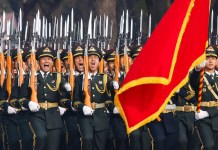After a “rare integrated military exercise” in eastern Ladakh bordering China last week, the Indian Defence Forces comprising the Army and Air Force will hold joint drills in Arunachal Pradesh in October. Arunachal Pradesh is a disputed territory between India and China and referred as South Tibet by Beijing.
Venezuela’s president Nicolas Maduro accused of crimes against humanity
Chinese Global Times (GT) states that by holding defence exercises along the Chinese border, India is clearly targeting an imaginary enemy i.e. China
After Indian PM Narendra Modi revoked the special status of Jammu and Kashmir, his personal popularity has reached a new peak within his country writes GT.
India is experiencing a severe economic downturn. In the second quarter of 2019, India’s GDP growth decreased to an over five-year low of 5%, way below expectations.
China, Pakistan Vow To Protect CPEC Projects, Gwadar Port Amid Regional Flare-Up
In 2018, many economists believed that India had the potential to become the world’s fastest-growing economy. Nonetheless, the growth rate of India’s economy dropped drastically from 8% in the same quarter of the last fiscal year to 5%, making the prediction unlikely to come true.
Against such a backdrop, it is more apparent that Modi’s recent moves are a bid to cover up domestic troubles as well as consolidate his public support.
Be as it may, as China-India relations are entering a crucial phase, Modi also expects a stable bilateral relationship with China, which is a significant partner of India in various domains. In 2018, the trade between the two countries reached $955.4 billion.
Chinese venture capital funds in India pumped in more than $5 billion, surpassing investments from the US and Japan. Worsening relations with China amid the economic downturn will bring India nothing but adverse impacts writes the GT.
Modi’s policies are inconsistent. His government is loath to give up its collaborative engagement with China on the one hand but does not stop advocating nationalism against China on the other. Such ambiguity can never be sustainable. It will only hurt mutual trust and harm India’s own interests.
China has been putting efforts in boosting ties with India. Given Delhi’s apprehensions over its trade deficit with Beijing, China is adjusting accordingly. For example, China’s revised drug law removes drugs that are legal in other countries but illegal in China from the list of fake medicines, opening a door for Indian generic medicines.
Inconsistent policies can solve neither domestic nor diplomatic problems. It is hoped that New Delhi will adopt effective measures, rather than relying on national sentiments, to deal with its issues and get along with China.
Via: Global Times




